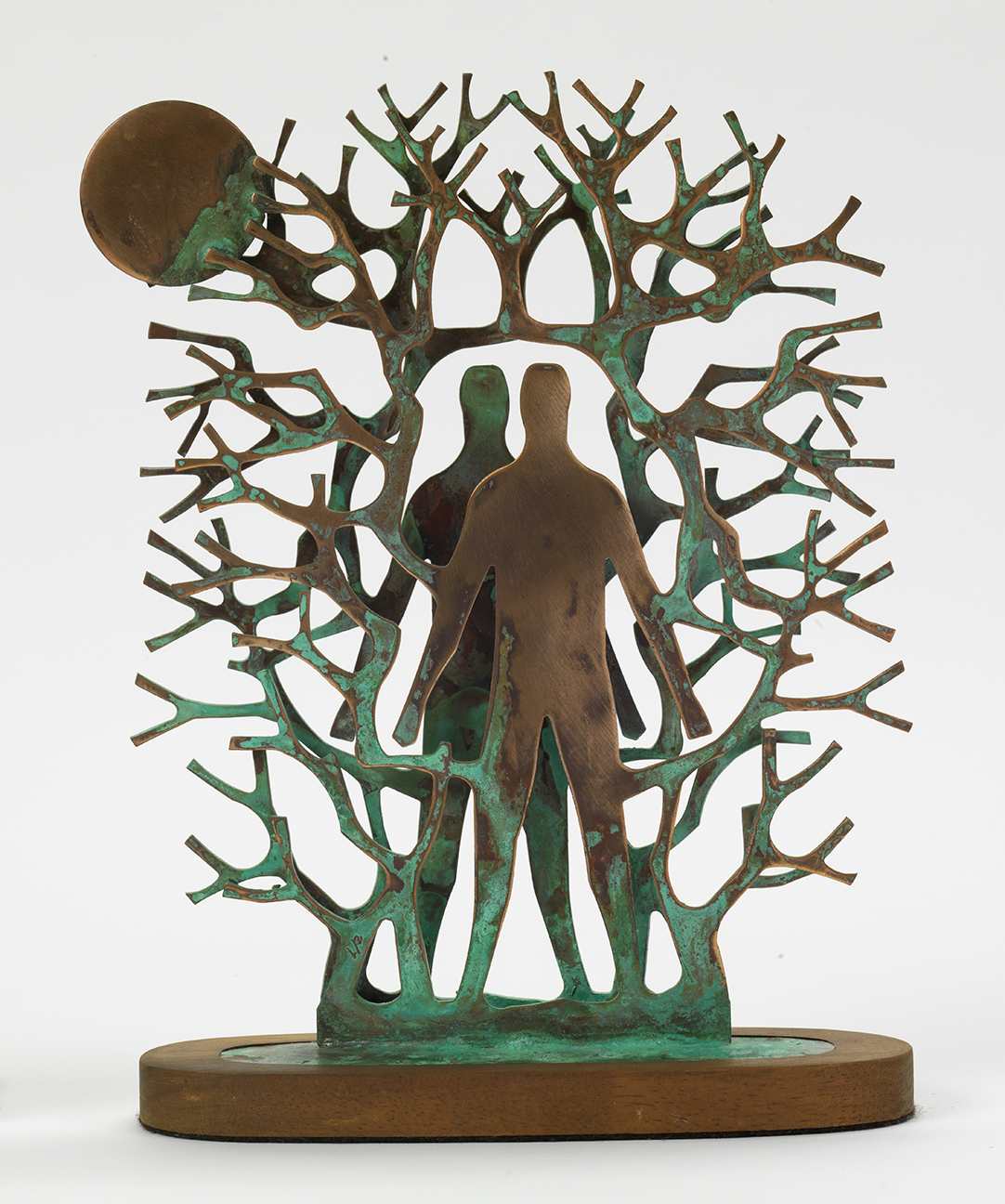
The school that has nurtured some of Hawaii’s most prominent artistic talents is coming to the fore at two companion shows at the Honolulu Museum of Art.
The museum will be presenting “Home of the Tigers,” a tribute to McKinley High School in Honolulu, which boasts an alumni including artists Satoru Abe, Raymond Han, and Robert Kobayashi, among others. The exhibition is accompanied by “Satoru Abe: Reaching for the Sun,” a major retrospective that unpacks the Hawaii-born artist’s oeuvre of abstract sculptures and paintings, which spans the greater part of a century.
“Home of the Tigers” is co-curated by married curator duo Tyler Cann and Alejandra Rojas Silva. “Satoru Abe: Reaching for the Sun” was curated by Silva with Katherine Love, HoMA’s associate curator of contemporary art.
Satoru Abe, Proud Old Tree (1958). Photo courtesy of Satoru Abe
Between the 1920s and ’40s, McKinley High School, one of Hawaii’s oldest public high schools, saw students from Abe to Kobayashi, John Chin Young to Ralph Iwamoto and Keichi Kimura, as well as Raymond Han; another artist, ʻImaikalani Kalahele, graduated a generation later in 1966. Besides tracing the journey of these seven students, “Home of the Tigers” also follows three art teachers—Minnie Fujita, Charles Higa, and Shirley Russell—who quietly incubated the creative talent in their classrooms.
“These teachers spent decades in this school,” said Silva. “They had the option to go other places, but they were really committed to what an art education to do and the options it can give to students.”
Satoru Abe, Waiting by the Window (1969). Photo courtesy of Satoru Abe.
Abe, now 98, did briefly leave Hawaii to pursue his practice, but looks back at his high school with a certain fondness. In an interview, he told me he only enrolled in art classes because it was “the easiest course” he could take. “No one was serious about art, and no one made a living out of doing art,” he said of the time.
After graduation, he attended summer classes at the California School for Fine Arts, and, with McKinley classmate Iwamoto, ended up in New York in the 1950s, where he joined the ranks of avant-garde artists such as George Grosz and Louis Bouche. Kobayashi also spent time in New York, so they would have known each other. Many of them worked at the Museum of Modern Art.
“The rest of the artists all did their best in school,” Abe said of his peers. “As for memories, mine are distant.”
John Young, Koolau Mountains (1983). Photo courtesy of The John Young Foundation.
Curators Cann and Silva are not native to Hawaii and recently joined HoMA’s staff. So, they stumbled into the idea for the shows by happy accident as the went through drawers of work to research prints in the museum’s collection.
“As we were just doing even the most cursory Wikipedia research on some of these artists, it always said, ‘went to McKinley High School,’” Cann said.
Raymond Han, Still Life with Alstroemeria (1986). Photo courtesy of the Honolulu Museum of Art.
“What happens often in Honolulu is that they tell you where they went to high school. Because we are new, this is a coded language that we don’t understand,” Silva added. “We know that if they’re telling us where they went to high school, it’s very meaningful. It is a way that that people in Honolulu organize and identify themselves.”
(Also of note: the museum’s art school once housed McKinley itself, making the exhibition all the more resonant.)
Ralph Iwamoto. Equinox, from the “Floating World” series. Photo courtesy of Hollis Taggart, New York
Because the artists mostly attended the school at different times and come from different cultural backgrounds, “Home of the Tigers” is structured like a tree. A main corridor addressed the artists’ attendance at the schools with accompanying paraphernalia before branching into other hallways dedicated to the artists and their independent journeys.
“We have artists in this show who would not necessarily be shown together otherwise,” Cann said, with Silva adding that they aren’t really trying to make the works visually cohere to each other. The pair noted, however, that visual similarities can naturally be seen between works by former students and the professors who taught them.
Keichi Kimura, Phoenix (1972). Photo courtesy of Juli Kimura.
The curators admitted that the show is far from exhaustive and doesn’t capture all the artists who attended McKinley. Still, they hope to use what they found in their research to enhance future exhibitions. More so, they hope to lure current students of McKinley, which is currently located just two blocks from HoMA, into the museum an “inviting” show.
“Art is freedom and unstructured,” Abe said, speaking to the value of art in education. “We need to explore the unpredictable. It opens up your mind to other things.”
Charles Higa, Geode (c. 1970). Photo courtesy of the Estate of Charles E. Higa.
“Home of the Tigers” will be on view at the Honolulu Museum of Art, 900 S Beretania St., Honolulu, Hawaii, September 28, 2024–January 12, 2025. “Satoru Abe: Reaching for the Sun” will run from Oct. 18, 2024-July 20, 2025.